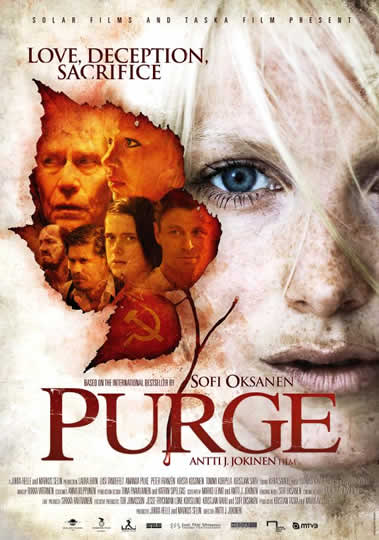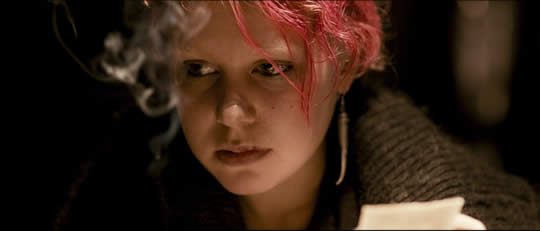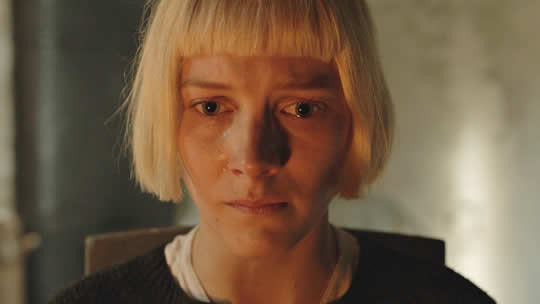 Hollywood-based Finnish director Jokinen (“The Resident”), adapted Finnish author Sofi Oksanen’s play and best selling novel “Puhdistus”(“Purge”) winner of both the 2008 Finlandia Prize and the 2009 Runeberg Prize.
Hollywood-based Finnish director Jokinen (“The Resident”), adapted Finnish author Sofi Oksanen’s play and best selling novel “Puhdistus”(“Purge”) winner of both the 2008 Finlandia Prize and the 2009 Runeberg Prize.
Followed the book’s structure, Jokinen showing the character’s reactions to their questionable actions, then flashbacking in time to see the motives for what they did.
Part melodrama, part historical Gothic, part woman’s revenge picture, “Purge” links the abuses wrought by S Tallinn’s legacy; The savage 1940 Soviet occupation of Estonia and the recent Russian Mafia sex trade
The harrowing redemptive story follows two women, both battle scarred from terrible abuse, both guilty of survival motivated crimes: Elderly Aliide, an Estonian Communist and young Zara, on the run from sex slavers. Jokinen developed an ambiance of violence to tell the two women’s stories. He faces the horror of the acts, but in the case of a torture scene, blacks out the graphic image.
Pink-haired Zara (Amanda Pilke), a young hooker on the run from her Russian mob captors, collapses near the remote farmhouse of Aliide Liisi Tandefelt), a grim-faced reclusive old biddy well able to fend for herself. The canny old woman sucks on her cheek, grabs a hatchet, and explores who or what is lying outside her house.
She brings the bruised, scantily dressed girl inside. At first it’s hard to tell who’s more suspicious, but Zara’s terrified demeanor softens Allide, who allows her to stay the night. Locking her guest in the bedroom, she guards the house and thinks.” Don’t worry, I’m used to sleeping in a locked room”, call Zara. “What’s your Mother’s name?” “Linda” the old biddy blanches. Long-suppressed memories surface, destabilizing her. Zara also fights the horror of her memories.
It’s a long way from Lillian Gish and the run away kids in “Night Of The Hunter”: or is it?
Seeking domestic work in Berlin, Zara and her friend are abducted by Russian sex slavers. Pasa (Kristjan Sarv) enforces their control. “You’ll learn to whore: they all do.” She does. Drugged, Zara works off her unpayable debt for clothes and “training” (rape) and not following orders. She has no hope of escape until they sell her to a greedy john. By the time she makes it to the farm, she has one possession- the picture of two young women signed “For Aliide from her sister.”
Aliide figures out the connection first. A flashback: two lovely sisters, blond (Laura Birn) and brunette Ingel (Krista Kosonen) notice a handsome farm worker. Aliide spots Hans (Peter Franzen) first, “Just let him look at me,” she prays, but he’s smitten with her sister. They marry, have a child, and once the girls’ parents are sent to Siberia as “enemies of the state” the three live together at the family farm, but Aliide suffers a poisonous unrequited love.
When Ingel gives birth to Linda, bitter Aliide can’t even celebrate their child. “She was so worried about you, I found her praying in the barn, explains Hans. We suspect she was praying childbirth would carry off her rival.
Hans secretly leaves for Finland to join the Finnish Army, returning with his buddies to join the Brotherhood Of Forest, nationalist rebels. Aliide refuses. “They’ll kill you.” “She’s right, please stay, just for a week”, begs Ingel and poor Hans’s fate is sealed. The two carve out a hidey-hole between the walls.
When the rebels come looking for Hans, Allide tells them he’s been killed. “If they die” she assures Ingel, “no-one else will know he’s alive.” As the heroes march off to certain death, she murmurs “Die Die Die.” (No doubt a redux of the barn scene.)
As the daughters of known “Fascist traitors” they fall under suspicion, especially Hans Pekk’s “widow.” Allide’s accused of taking food to the rebels. Her interrogation becomes a Russian gang rape in the basement of the Town Hall. Refusing to give up Hans, she disassociates. “I’m not here”, she intones, day dreaming about summer fields, only to wake on a cold floor as the rapists piss over her bruised body.
Chastened, pragmatic Allide starts attending Party meetings. Taken by Martin (a charismatic Party organizer from Talliinn) she asks, “Will you teach me about Marx and Lenin?” One night of sex and she decides to marry the man who can get her a Party job and protect her. But collecting Party membership dues is a terrible job. The neighboring peasants slam their doors or spit in her face. “They hate me, but treat Martin well,” she wonders.
Each step adapting to the Communist system hardens the survivalist Allide’s spirit, until she is capable of the direst decisions. The Russian Officer Colonel (Tomi Salmela) calls her in for another interrogation. To her horror she finds Ingel and little Linda, cuffed with hoods over their heads, while Russian torturers lounge laughing in the background.
To exert his control over her, the Colonel forces her, at gunpoint, to torture Linda, as hooded Ingel struggles in the background. The camera cuts away from her most shameful crime.
She wants the house, and Martin promises to get it for her if she’s willing to betray her sister and niece. She agrees. They are sent to Siberia. Other betrayals follow.
When Pes and his goon drive up to the isolated farm, Allide hides Zara in her
Grandfather’s hiding place. The tough bird faces off the pimps, her wartime pistol pointed at them under the table. Pes flashes a cop’s badge.” We’re looking for a dangerous girl.”She dismisses him. “There’s lots of false ID”s floating around.” “She’s done horrible things,” he says. “How horrible?” wonders Allide. “She’s murdered her boyfriend and stolen his car,” he answers showing her pictures.
They leave, seemingly satisfied, but both women know they’ll be back. “Did you murder him?” she asks her grandniece, recognizing another secret they share.
 Zara’s flashback shows her murderous escape from her newest “owner”. Allide’s flashback details another crime that haunts her.
Zara’s flashback shows her murderous escape from her newest “owner”. Allide’s flashback details another crime that haunts her.
In an elegiac mood, old Allide writes the overdue letter to Ingel and Linda, “I’ve finally learned to cook. The pimps return, demanding the hidden Zara. Before they can torture her she shoots them, screaming her confession. “They’re all dead. Hans Pekk is dead.” Pilfering the dead man’s pockets she recovers Zara’s passport and a wad of cash. She sends her grand niece home to Finland, liberated, then sits and torches her home, to the poetic words of Oksanen’s play. Redemption comes at final price for the woman who endured German and Soviet Occupation and a lifetime of toxic secrets.
Meticulously storyboarded, the film is darkly beautiful. In DP Rauno Ronkainen’s hands rural Estonia, past and present, is almost a fairy tale setting. Blurry shots echo the submerged guilty memories that haunt both women survivors. Scenes in the brothel in 1992 Berlin, where Zara is imprisoned, use claustrophobic hand held camera moves. The historical scenes of wartime and post war Estonia have a classic studio look.
Tuomas Kantelinen’s spare but powerful score smooths the way and build understanding for the characters driven to unacceptable acts to survive. The orchestral score by Kantelinen (“Mother Mine”, ”The Italian Key”, “Mongol”) features short burst of plangent music and violin solos by Victoria Mullova. Long silent sections of the film allow the women’s memory plays to unreel.
The related women have each fallen prey to Russian abuse, both victims of the systemic abuses of Stalinist Russia and it’s aftermath; but the underlying thrust is universal. As long as there has been war, “soft-target” women and children, have suffered death and worse.
UN Security Council resolution 1325 (2000) was established to protect and remedy the rights of women during and after armed conflict: but as we see in war regions around he world, the attack on soft targets (women and children) is rising at an alarming rate. SEE.

